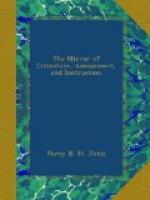New Monthly Magazine.
* * * * *
THE SELECTOR.
AND
LITERARY NOTICES OF NEW WORKS.
* * * * *
CHRONICLES OF THE CANONGATE.
[Ecce iterum Crispinus!—We intend to continue our notice of the above work in a series of snatches, or portraitures, for which mode (from its varied and detached character) it is perhaps better calculated than any of its predecessors. Our anticipatory anxiety in selecting the Two Drovers was a forcible illustration of the maxim, Qui dat cito, dat bis; for the extent occupied by the portion already quoted and its interruption, with the immense influx of works recently published, have somewhat interfered with our arrangements. In “the Introduction” to the “Chronicles,” Sir Walter Scott avows the authorship of the Waverley Novels, and recapitulates the explanation which took place at the Theatrical Fund Meeting, at Edinburgh, in July last. Sir Walter then proceeds to acknowledge, with gratitude, “hints of subjects and legends” which he received from various quarters, and occasionally used as a foundation of his fictitious compositions, or wove in the shape of episodes; and from these acknowledgments we select the following dram. pers.]
Old Mortality.—It was Mr. Train, supervisor of excise at Dumfries, who recalled to my recollection the history of Old Mortality, although I myself had a personal interview with that celebrated wanderer, so far back as about 1792. He was then engaged in repairing the grave-stones of the Covenanters who had died while imprisoned in the castle of Dunnottar, to which many of them were committed prisoners at the period of Argyle’s rising; their place of confinement is still called the Whig’s vault. Mr. Train, however, procured for me far more extensive information concerning this singular person, whose name was Patterson, than I had been able to acquire during my short conversation with him. He was (as I may have somewhere already stated) a native of the parish of Closeburn, in Dumfries-shire, and it is believed that domestic affliction, as well as devotional feeling, induced him to commence the wandering mode of life, which he pursued for a very long period. It is more than twenty years since Robert Patterson’s death, which took place on the high road near Lockerby, where he was found exhausted and expiring. The white pony, the companion of his pilgrimage, was standing by the side of its dying master; the whole furnishing a scene not unfitted for the pencil. These particulars I had from Mr. Train.




